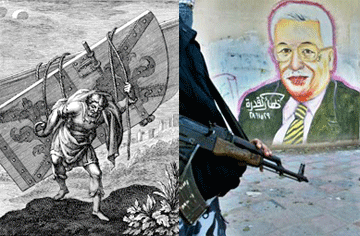
Illustration: left: “Samson carries gates” by Johann Christoph Weigel, 1695; right, Large mural of Palestinian presidential candidate Mahmoud Abbas in Gaza city, December 26, 2004, Reuters
The fragile and it seems futile political engagement of Fatah and Hamas has run into a veritable brick wall in Gaza, not surprising given all the mud slinging that has been going on. Hamas supporters have stormed what they see as the Bastille of President Mahmoud Abbas and in biblical terms carried away the gates. In reading the news reports today and looking at the pictures, especially the Hamas fighters gloating in Abbas’s former presidential office, it is as the baseball sage said “déjà vu all over again.” With fighting still continuing in Palestinian refugee camps in Lebanon, the agony of Palestinian suffering endures. Of course, this is not the first time that havoc has raged in Gaza. Since so little is held sacred in the “Holy Land,’ we might as well raid scripture and summon up an ancient moral tale that ended with a blind man’s suicide in which the temple walls came tumbling down. Today it is obvious there is no Samson in the heroic sense, and recent events confirm that the the blind still lead the blind, while much of the rest of the world simply turns a blind eye. In such times perhaps the only antidote to unstoppable tears is poetry…
How Samson Bore Away the Gates of Gaza
(A Negro Sermon.)
Once, in a night as black as ink,
She drove him out when he would not drink.
Round the house there were men in wait
Asleep in rows by the Gaza gate.
But the Holy Spirit was in this man.
Like a gentle wind he crept and ran.
(“It is midnight,” said the big town clock.)
He lifted the gates up, post and lock.
The hole in the wall was high and wide
When he bore away old Gaza’s pride
Into the deep of the night: —
The bold Jack Johnson Israelite, —
Samson —
The Judge,
The Nazarite.
The air was black, like the smoke of a dragon.
Samson’s heart was as big as a wagon.
He sang like a shining golden fountain.
He sweated up to the top of the mountain.
He threw down the gates with a noise like judgment.
And the quails all ran with the big arousement.
But he wept — “I must not love tough queens,
And spend on them my hard earned means.
I told that girl I would drink no more.
Therefore she drove me from her door.
Oh sorrow!
Sorrow!
I cannot hide.
Oh Lord look down from your chariot side.
You made me Judge, and I am not wise.
I am weak as a sheep for all my size.”
Let Samson
Be coming
Into your mind.
The moon shone out, the stars were gay.
He saw the foxes run and play.
He rent his garments, he rolled around
In deep repentance on the ground.
Then he felt a honey in his soul.
Grace abounding made him whole.
Then he saw the Lord in a chariot blue.
The gorgeous stallions whinnied and flew.
The iron wheels hummed an old hymn-tune
And crunched in thunder over the moon.
And Samson shouted to the sky:
“My Lord, my Lord is riding high.”
Like a steed, he pawed the gates with his hoof.
He rattled the gates like rocks on the roof,
And danced in the night
On the mountain-top,
Danced in the deep of the night:
The Judge, the holy Nazarite,
Whom ropes and chains could never bind.
Let Samson
Be coming
Into your mind.
Whirling his arms, like a top he sped.
His long black hair flew round his head
Like an outstretched net of silky cord,
Like a wheel of the chariot of the Lord.
Let Samson
Be coming
Into your mind.
Samson saw the sun anew.
He left the gates in the grass and dew.
He went to a county-seat a-nigh.
Found a harlot proud and high:
Philistine that no man could tame —
Delilah was her lady-name.
Oh sorrow,
Sorrow,
She was too wise.
She cut off his hair,
She put out his eyes.
Let Samson
Be coming
Into your mind.